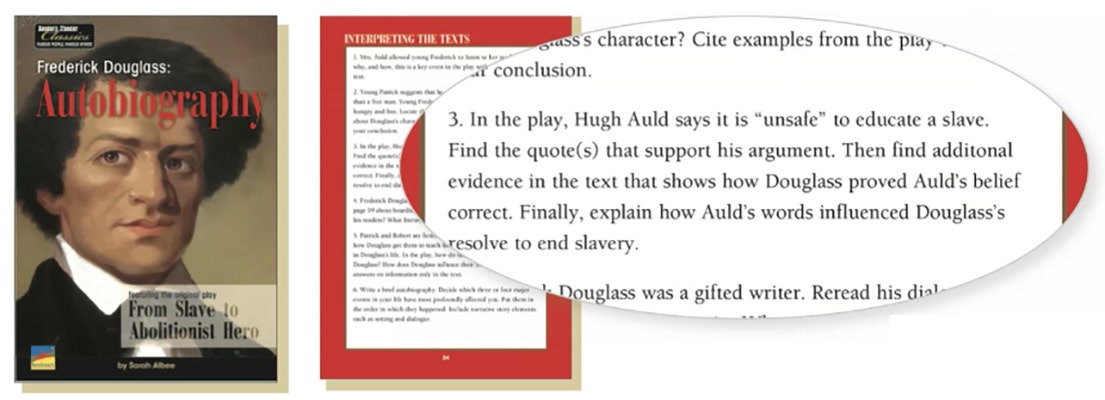Skip to Content
Language
- Benchmark Education
- Newmark Learning
- Reycraft Books
- Create an Account
Reader's Theater Classics: Famous People, Famous Words
Reader's Theater Classics: Famous People Famous Words
Engage middle school students in active learning about historic authors, documents, and events.
24 multi-leveled scripts provide multiple cross-text perspectives on diverse eras, cultures, and genres.
- Link biography and drama to primary source documents.
- Develop cross-text analysis and evidence-based answers.
- Actively explore diverse opinions and points of view.
- Make complex text more accessible and comprehensible.

-
 Alice Paul: The 19th Amendment - 6-Pack WW-Y14374Voting-rights activist Alice Paul was imprisoned in 1917, along with her womenÕs suffrage cohorts. There she embarked on an uncompromising hunger strike that helped to bring their cause to a turning point.$39.00Grade 5 - 9
Alice Paul: The 19th Amendment - 6-Pack WW-Y14374Voting-rights activist Alice Paul was imprisoned in 1917, along with her womenÕs suffrage cohorts. There she embarked on an uncompromising hunger strike that helped to bring their cause to a turning point.$39.00Grade 5 - 9 -
 Abraham Lincoln, The Lincoln-Douglas Debates - 6-Pack WW-Y14373It’s the middle of the night in August 1858 before the second debate for the U.S. Senate seat. Stephen Douglas and his challenger, Abraham Lincoln, are up discussing their political strategies and policies with their advisers.$39.00Grade 5 - 9
Abraham Lincoln, The Lincoln-Douglas Debates - 6-Pack WW-Y14373It’s the middle of the night in August 1858 before the second debate for the U.S. Senate seat. Stephen Douglas and his challenger, Abraham Lincoln, are up discussing their political strategies and policies with their advisers.$39.00Grade 5 - 9 -
 Anne Frank: The Diary of a Young Girl - 12-Pack WW-Y14375Fearing for their lives during the World War II German occupation of Holland, eight Jews have hidden themselves in secret rooms above a factory and offices.$59.00Grade 5 - 9
Anne Frank: The Diary of a Young Girl - 12-Pack WW-Y14375Fearing for their lives during the World War II German occupation of Holland, eight Jews have hidden themselves in secret rooms above a factory and offices.$59.00Grade 5 - 9 -
 Anthony Burns: The Fugitive Slave Act - 12-Pack WW-Y14376An uninformed but curious farmer and a truth-seeking newspaper reporter attend a rally to free the captured slave Anthony Burns in Boston in 1854. Then they become caught up in the trial that put the Fugitive Slave Act in the national spotlight.$59.00Grade 5 - 9
Anthony Burns: The Fugitive Slave Act - 12-Pack WW-Y14376An uninformed but curious farmer and a truth-seeking newspaper reporter attend a rally to free the captured slave Anthony Burns in Boston in 1854. Then they become caught up in the trial that put the Fugitive Slave Act in the national spotlight.$59.00Grade 5 - 9 -
 Franklin Delano Roosevelt: The New Deal - 6-Pack WW-Y14378It is Saturday, March 4, 1933, at the height of the Great Depression. Like so many other families, the Williamses and Gorskis of Paterson, NJ, are facing unemployment, eviction, bread lines, and other hard times.$39.00Grade 5 - 9
Franklin Delano Roosevelt: The New Deal - 6-Pack WW-Y14378It is Saturday, March 4, 1933, at the height of the Great Depression. Like so many other families, the Williamses and Gorskis of Paterson, NJ, are facing unemployment, eviction, bread lines, and other hard times.$39.00Grade 5 - 9 -
 Frederick Douglass: Autobiography - 12-Pack WW-Y14379In 1853, orator and former slave Frederick Douglass delivers a speech about his early days as a slave boy in Baltimore and the unique way he learned to read and write.$59.00Grade 5 - 9
Frederick Douglass: Autobiography - 12-Pack WW-Y14379In 1853, orator and former slave Frederick Douglass delivers a speech about his early days as a slave boy in Baltimore and the unique way he learned to read and write.$59.00Grade 5 - 9 -
 George Washington: Farewell Address - 6-Pack WW-Y14380George Washington, first president of the United States, was respected by opposing sides of the young country’s political debates, even when those debates became heated. Washington was known as down-to-earth, fair, and honest.$39.00Grade 5 - 9
George Washington: Farewell Address - 6-Pack WW-Y14380George Washington, first president of the United States, was respected by opposing sides of the young country’s political debates, even when those debates became heated. Washington was known as down-to-earth, fair, and honest.$39.00Grade 5 - 9 -
 Harriet Beecher Stowe: Uncle Tom's Cabin - 12-Pack WW-Y14381Harriet Beecher Stowe’s emotionally charged 1852 novel Uncle Tom’s Cabin has people on both sides of the slavery issue in an uproar.$59.00Grade 5 - 9
Harriet Beecher Stowe: Uncle Tom's Cabin - 12-Pack WW-Y14381Harriet Beecher Stowe’s emotionally charged 1852 novel Uncle Tom’s Cabin has people on both sides of the slavery issue in an uproar.$59.00Grade 5 - 9 -
 Jacob Riis: How the Other Half Lives - 6-Pack WW-Y14383Muckraking photojournalist Jacob Riis brings his camera into the slums of New York City’s Lower East Side in the late 1880s and hardened young immigrants help him in his quest to turn an urban eyesore into a welcome patch of green.$39.00Grade 5 - 9
Jacob Riis: How the Other Half Lives - 6-Pack WW-Y14383Muckraking photojournalist Jacob Riis brings his camera into the slums of New York City’s Lower East Side in the late 1880s and hardened young immigrants help him in his quest to turn an urban eyesore into a welcome patch of green.$39.00Grade 5 - 9 -
 Harriet Tubman: "Follow the Drinking Gourd" - 12-Pack WW-Y14382Harriet Tubman, a fugitive slave, returns to pre-Civil War Maryland to help lead a group of runaways to freedom along the perilous path of the Underground Railroad$59.00Grade 5 - 9
Harriet Tubman: "Follow the Drinking Gourd" - 12-Pack WW-Y14382Harriet Tubman, a fugitive slave, returns to pre-Civil War Maryland to help lead a group of runaways to freedom along the perilous path of the Underground Railroad$59.00Grade 5 - 9
